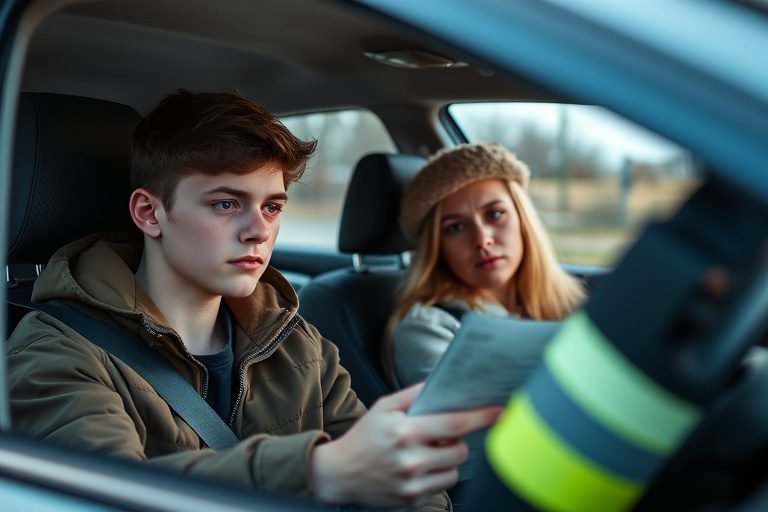Did Your Kid Just Get Their First Ticket? Here’s What to Do
Getting a ticket is a defining moment for many teen drivers. It often triggers a mix of emotions—confusion, embarrassment, and concern—especially for parents who now have to handle the fallout. This moment can influence how a teen drives in the future, affecting their habits, financial responsibilities, and sense of accountability behind the wheel.
Handled with intention, the experience becomes more than just a frustrating hiccup. It opens the door to meaningful conversations, better decision-making, and long-term growth. What happens next isn’t just about damage control—it’s about shaping a smarter, safer driver for years to come.

The First 24 Hours: Why They Matter Most
What you do right after getting a ticket can change everything. Talking to a traffic lawyer gives you expert advice and might help avoid problems like higher insurance rates or marks on a driving record. A lawyer can explain if there are ways to delay or lessen the impact of the ticket. In some cases, the ticket can even be dismissed, helping keep the teen’s record clean.
Early action shapes how a teen responds to mistakes. Instead of focusing on punishment, guide them toward learning and accountability. Sound advice now—especially from legal experts—can build confidence, prevent repeat issues, and reinforce long-term responsibility behind the wheel.
How One Ticket Can Hike Your Rates
That first ticket often costs more than just the fine. Insurance rates usually go up, and when a young driver is on the policy, those increases can be big. Insurance companies pay close attention to driving records. Even a small violation might lead to higher bills when it’s time to renew the policy. Knowing how the ticket will affect your insurance helps manage both short- and long-term costs.
Talking with your teen about these effects helps build responsibility. Every ticket adds points to their record, and each point brings more costs. Taking a driver’s ed class or attending traffic school can lower the impact and improve their driving habits, possibly even lowering future premiums.
Turning a Ticket into a Teaching Moment
A traffic ticket feels like a setback, but it’s also a chance to grow. Letting your teen handle the court process helps them face the consequences directly and take ownership. It may feel awkward or tense at first, but that discomfort can spark maturity and a deeper respect for the rules of the road.
After the court date, signing up for a driver’s ed course can strengthen driving skills and turn the situation into something constructive. It might also help to write about the experience and lessons learned. This reflection encourages deeper understanding and builds accountability—without leaving a lasting mark on the record.
Legal Pitfalls That Could Make a Small Mistake Worse
Missing deadlines or ignoring notices about a ticket can make things worse. Skipping a court date or not paying the fine on time can lead to serious consequences, like losing your license. Courts and police often see inaction as ignoring the law, which creates bigger problems. Knowing all deadlines and notices helps your teen handle things the right way.
Being aware of timelines can stop a small issue from growing. Staying on top of the ticket process helps make it a learning experience instead of a legal mess. Keeping a calendar with all the important dates is a smart way to stay organized and avoid mistakes.
Smart Habits That Stop Repeat Tickets Before They Start
Learning from a ticket can lead to better choices later. Building good habits now can keep your teen from getting another ticket and reinforce safe driving. Creating a plan for what to do if another ticket happens—like who to call—can provide helpful support. A shared driving log is another great tool. It lets parents and teens look at driving patterns and spot areas for improvement.
Open, judgment-free conversations go a long way. Talk through what happened, not just as a punishment but as a moment worth understanding. Real stories—your own or from others—can show how small mistakes turn into serious consequences. These discussions build trust, reinforce responsibility, and help your teen stay focused on making safer choices behind the wheel.
Getting a ticket may feel overwhelming, but it’s also a moment packed with potential. Taking smart steps—like speaking with a lawyer, tracking deadlines, and considering traffic school—can prevent bigger headaches and help your teen move forward with more awareness. Costs go beyond the fine, especially when insurance is involved, so tackling the issue early matters. Walk your teen through each part of the process and talk openly about what led to the ticket and how to avoid it next time. Instead of just reacting, use this as a chance to build better habits that make a lasting difference.
